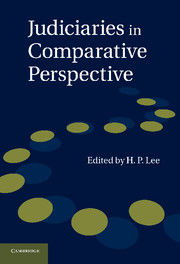Book contents
- Frontmatter
- Contents
- Contributors
- Foreword
- Preface
- Table of cases
- Table of statutes
- Part I
- Part II
- Part III
- Part IV
- 14 Judges, bias and recusal in Australia
- 15 Judges, bias and recusal in Canada
- 16 Judicial recusal in New Zealand
- 17 Judges, bias and recusal in South Africa
- 18 Judges, bias and recusal in the United Kingdom
- 19 Bias, the appearance of bias, and judicial disqualification in the United States
- Part V
- Part VI
- Index
- References
18 - Judges, bias and recusal in the United Kingdom
from Part IV
Published online by Cambridge University Press: 07 September 2011
- Frontmatter
- Contents
- Contributors
- Foreword
- Preface
- Table of cases
- Table of statutes
- Part I
- Part II
- Part III
- Part IV
- 14 Judges, bias and recusal in Australia
- 15 Judges, bias and recusal in Canada
- 16 Judicial recusal in New Zealand
- 17 Judges, bias and recusal in South Africa
- 18 Judges, bias and recusal in the United Kingdom
- 19 Bias, the appearance of bias, and judicial disqualification in the United States
- Part V
- Part VI
- Index
- References
Summary
The fundamental nature of the rule against bias
Nemo judex in re sua is both an ancient and fundamental principle of English law. A judge is disqualified from determining any case in which he or she may be, or may fairly be suspected to be, biased. The word ‘bias’ comes from the tendency of a bowl to turn in one direction of another. It thus means simply an improper predisposition of a judge to decide in one way or another. But if the fundamental nature of the rule is well recognised, its application and reach is less clear. The law is set about by some subtle distinctions which have been unstable and uncertain in the recent past. The law is now relatively clear, but the way in which it is applied is still open to debate and discussion.
This chapter will start with a consideration of two interlinked but important themes necessary for an understanding of the law. The first of these is the question of whether the rule is, in truth, a rule against bias at all or whether it is a rule against the appearance of bias. Judicial views have differed on this in the past eighteen years but, as will be seen, the issue is now largely settled in favour of the view that it is the appearance of bias that is predominant. This result is keyed into the primary purpose that lies behind the rule against bias: it is to protect and secure public confidence in the administration of justice.
- Type
- Chapter
- Information
- Judiciaries in Comparative Perspective , pp. 361 - 378Publisher: Cambridge University PressPrint publication year: 2011
References
- 1
- Cited by

